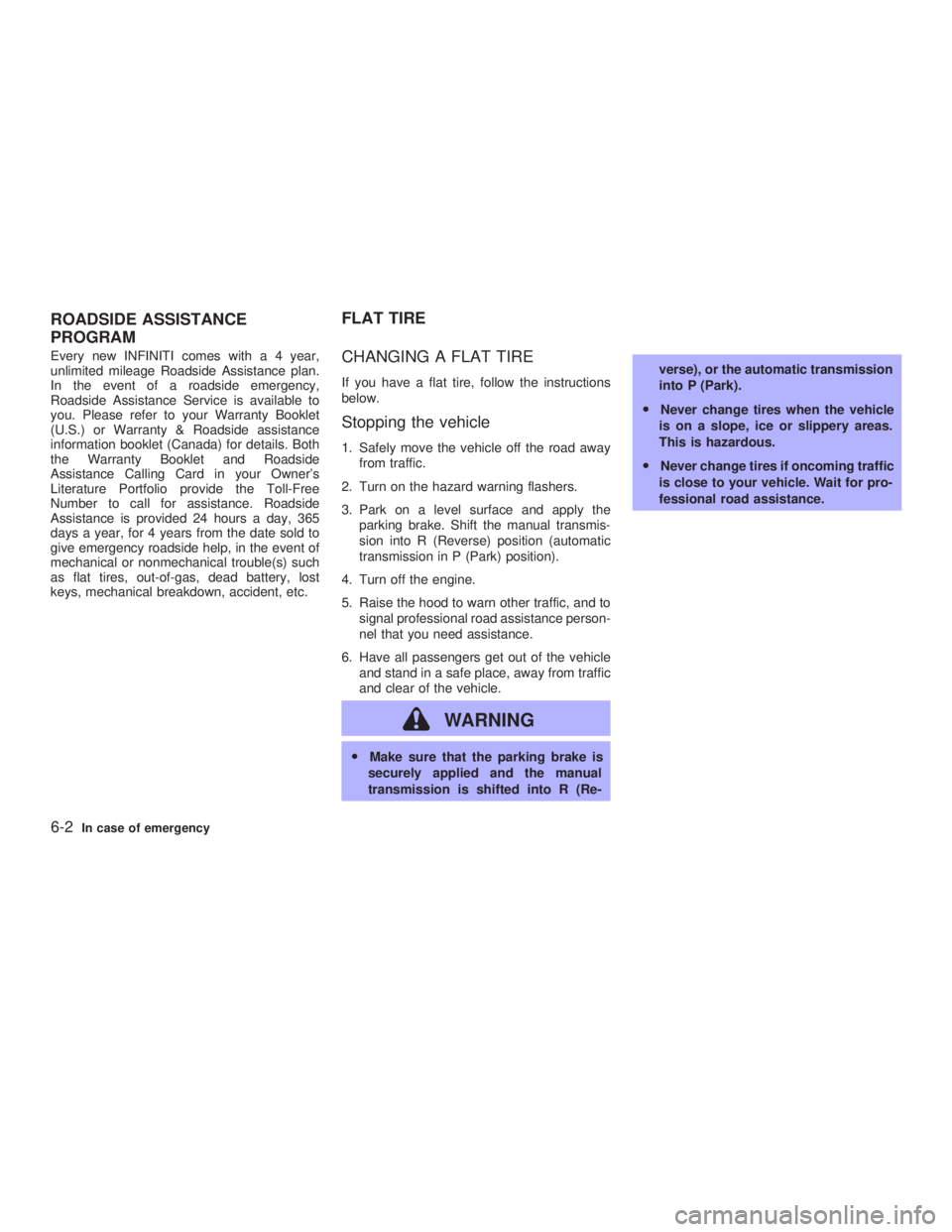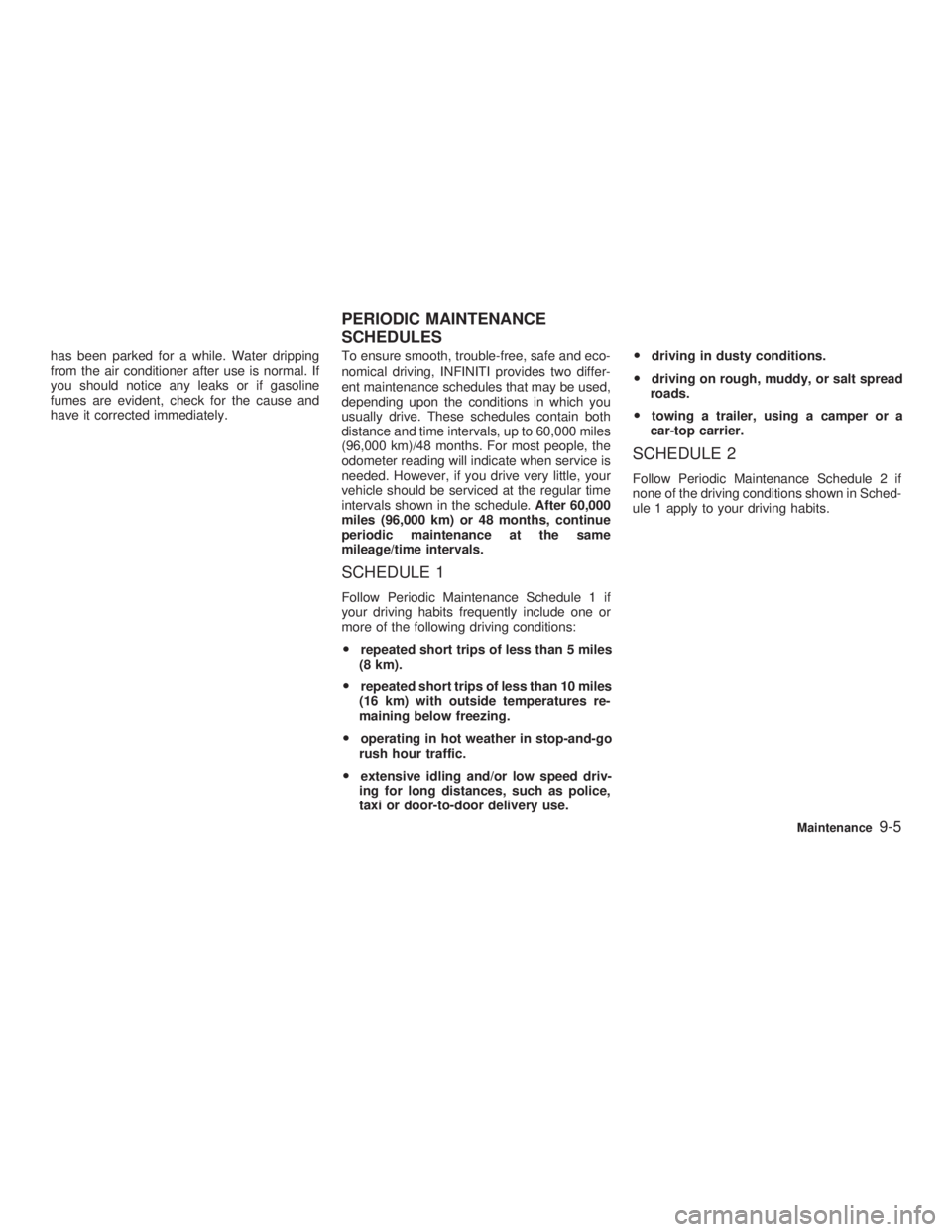Page 153 of 256

O HEADED UPHILL WITH CURB:
j 2
Turn the wheels away from the curb and
move the vehicle back until the curb side
wheel gently touches the curb.
O HEADED UPHILL OR DOWNHILL, NO
CURB:
j 3
Turn the wheels toward the side of the road
so the vehicle will move away from the
center of the road if it moves.
4. Turn the ignition key to the LOCK position
and remove the key. The power assisted steering is designed to
use a hydraulic pump, driven by the engine, to
assist steering.
If the engine stops or the drive belt breaks, you
will still have control of the vehicle. However,
much greater steering effort is needed, espe-
cially in sharp turns or at low speeds.
WARNING If the engine is not running or is turned
off while driving, the power assist for the
steering will not work. Steering will be
much harder to operate. BRAKING PRECAUTIONS The brake system has two separate hydraulic
circuits. If one circuit malfunctions, you will still
have braking at two wheels.
Vacuum assisted brake
The brake booster aids braking by using en-
gine vacuum. If the engine stops, you can stop
the vehicle by depressing the brake pedal.
However, greater foot pressure on the brake
pedal will be required to stop the vehicle and
the stopping distance will be longer.
Wet brakes
When the vehicle is washed or driven through
water, the brakes may get wet. As a result,
your braking distance will be longer and the
vehicle may pull to one side during braking.
To dry brakes, drive the vehicle at a safe
speed while lightly pressing the brake pedal to
heat-up the brakes. Do this until the brakes
return to normal. Avoid driving the vehicle at
high speeds until the brakes function correctly.
Using the brakes
Avoid resting your foot on the brake pedal
while driving. This overheats the brakes, in-
creases wear on the brake linings and pads,
and reduces gas mileage.POWER STEERING BRAKE SYSTEM
Starting and driving
5-19
Z 02.7.29/V35-D/V5.0
X
Page 160 of 256

Every new INFINITI comes with a 4 year,
unlimited mileage Roadside Assistance plan.
In the event of a roadside emergency,
Roadside Assistance Service is available to
you. Please refer to your Warranty Booklet
(U.S.) or Warranty & Roadside assistance
information booklet (Canada) for details. Both
the Warranty Booklet and Roadside
Assistance Calling Card in your Owner's
Literature Portfolio provide the Toll-Free
Number to call for assistance. Roadside
Assistance is provided 24 hours a day, 365
days a year, for 4 years from the date sold to
give emergency roadside help, in the event of
mechanical or nonmechanical trouble(s) such
as flat tires, out-of-gas, dead battery, lost
keys, mechanical breakdown, accident, etc. CHANGING A FLAT TIRE If you have a flat tire, follow the instructions
below.
Stopping the vehicle 1. Safely move the vehicle off the road away
from traffic.
2. Turn on the hazard warning flashers.
3. Park on a level surface and apply the
parking brake. Shift the manual transmis-
sion into R (Reverse) position (automatic
transmission in P (Park) position).
4. Turn off the engine.
5. Raise the hood to warn other traffic, and to
signal professional road assistance person-
nel that you need assistance.
6. Have all passengers get out of the vehicle
and stand in a safe place, away from traffic
and clear of the vehicle.
WARNING O Make sure that the parking brake is
securely applied and the manual
transmission is shifted into R (Re- verse), or the automatic transmission
into P (Park).
O Never change tires when the vehicle
is on a slope, ice or slippery areas.
This is hazardous.
O Never change tires if oncoming traffic
is close to your vehicle. Wait for pro-
fessional road assistance.ROADSIDE ASSISTANCE
PROGRAM FLAT TIRE
6-2 In case of emergency
Z 02.7.29/V35-D/V5.0
X
Page 217 of 256

has been parked for a while. Water dripping
from the air conditioner after use is normal. If
you should notice any leaks or if gasoline
fumes are evident, check for the cause and
have it corrected immediately. To ensure smooth, trouble-free, safe and eco-
nomical driving, INFINITI provides two differ-
ent maintenance schedules that may be used,
depending upon the conditions in which you
usually drive. These schedules contain both
distance and time intervals, up to 60,000 miles
(96,000 km)/48 months. For most people, the
odometer reading will indicate when service is
needed. However, if you drive very little, your
vehicle should be serviced at the regular time
intervals shown in the schedule. After 60,000
miles (96,000 km) or 48 months, continue
periodic maintenance at the same
mileage/time intervals.
SCHEDULE 1 Follow Periodic Maintenance Schedule 1 if
your driving habits frequently include one or
more of the following driving conditions:
O repeated short trips of less than 5 miles
(8 km).
O repeated short trips of less than 10 miles
(16 km) with outside temperatures re-
maining below freezing.
O operating in hot weather in stop-and-go
rush hour traffic.
O extensive idling and/or low speed driv-
ing for long distances, such as police,
taxi or door-to-door delivery use. O driving in dusty conditions.
O driving on rough, muddy, or salt spread
roads.
O towing a trailer, using a camper or a
car-top carrier.
SCHEDULE 2 Follow Periodic Maintenance Schedule 2 if
none of the driving conditions shown in Sched-
ule 1 apply to your driving habits.PERIODIC MAINTENANCE
SCHEDULES
Maintenance
9-5
Z 02.7.29/V35-D/V5.0
X